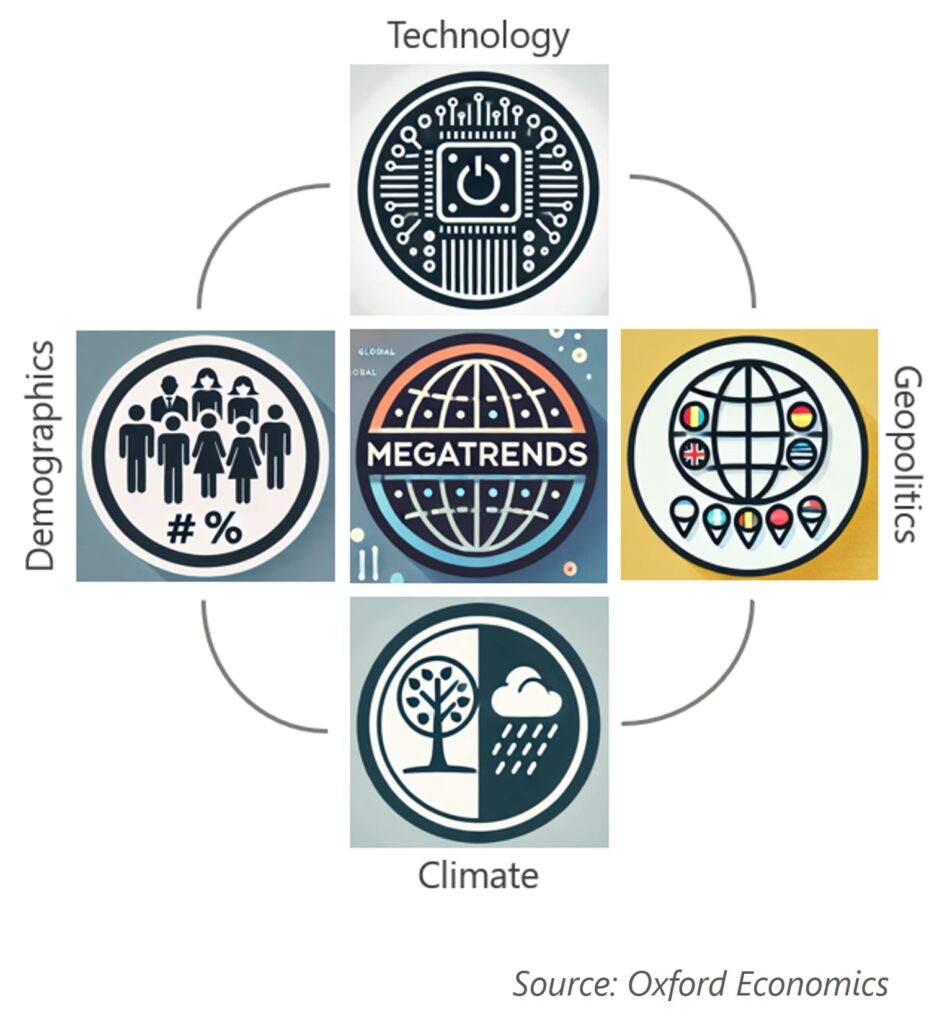Commercial Real Estate Megatrend Resilience Index
Understanding key megatrends shaping commercial real estate (CRE) and identifying the most resilient CRE markets

Key Findings
- Advanced economies are generally better positioned for the critical megatrends, with Australia, Singapore and the UK leading the way.
- Among developing economies, Malaysia ranks the top for all-property score, driving by strong scores from its hotel, retail and industrial sectors.
- Residential is the most favourable sector, followed by industrial, hotels and retail. Offices are the least favourable, although there are still markets that look better placed.
About Commercial Real Estate Megatrend Resilience Index
When developing long-term investment strategies, CRE professionals are focussed on the fundamental forces that can dramatically transform the global economy. These forces, known as megatrends, drive technological advancements, transform societies and alter the investment landscape.
At Oxford Economics, we have identified Demographics, Technology, Geopolitics and Climate as the most critical megatrends for CRE investment. To assist CRE professionals in evaluating the resilience of CRE across various regions and sectors, we developed the Commercial Real Estate Megatrend Resilience Index. The index covers 25 locations, representing 97% of the global CRE investible universe.
We evaluate each location’s CRE market resilience to the four megatrends, projected through 2050, and assign scores ranging from 0 (least favourable) to 100 (most favourable) at all property level. We then apply this methodology at the sector level, evaluating specific indicators relevant to each megatrend for each sector.
Overall
Megatrends do not exist in isolation; they often intersect and sometimes clash, catching investors out. In creating this index, we evaluate each location’s CRE market resilience to the four megatrends, projected through 2050, and assign scores ranging from 0 (least favourable) to 100 (most favourable) at all property level and across five property sectors. This allows us to offer a holistic view of long-run prospects key CRE markets.

Climate
A growing awareness of global warming and the impact of natural disasters has brought concerns about the damages of climate change to the fore. In this index, we evaluate the impact of climate change on real estate through two channels: demand and cost of mitigation. Lower impacts from climate scenarios on the economy and industries suggest a reduced risk to CRE demand drivers, while lower costs of renovating real estate to meet decarbonisation targets indicate a lower climate transition risk premium. Both factors contribute to higher rankings in the index.
Indicators used in Climate Change megatrend:
- Forecasts of real GDP and GVA of nine key industries under climate scenarios powered by the Global Climate Service.
- Climate transition risk premium, developed by the Real Estate Economics Service.
Geopolitics
Geopolitics shapes many aspects of the global economy, influencing everything from trade relations to national economic and security policies to conflicts and instability. To evaluate real estate market’s exposure to geopolitical risks, we utilise key geopolitical scenarios from our Global Scenario Service and calculate the difference in levels of the two-year ahead forecast between industry-level output under the baseline and each scenario. Lower impacts on output suggest reduced risk to key CRE demand drivers from current geopolitical scenarios, resulting in a higher ranking in our index.
Indicators used in Geopolitics megatrend:
- Forecasts of real GDP and GVA of nine key industries under geopolitical scenarios powered by the Global Scenarios Service
Technology
Technological advancements touch every part of the real estate industry, from property design and construction to operations, strategy and investment. In addition, technology can significantly impact productivity, thereby influencing economic growth and real estate demand.
In this index, we evaluate the impact of technology on real estate using our estimates of labour market exposure to generative AI, forecasts of long-run productivity growth as well as results from the Oxford Insights Government AI Readiness Index. Markets with lower labour market exposure to generative AI, greater AI readiness and stronger productivity prospects are expected to rank higher in our index.
Indicators used in Technology megatrend:
- Labour market exposure to generative AI. More details available here.
- Productivity growth in the overall economy and the nine key industries.
- Oxford Insights Government AI Readiness Index
Demographics
Demographic trends, such as ageing populations, urbanisation, migration patterns and changes in family structure, can significantly impact CRE supply and demand dynamics. This can span from increased demand for retirement living or healthcare facilities from ageing populations or more centrally located high-quality apartments due to more households that are smaller in size, wealthier and urban dwelling.
In this index, we assess demographics using the following indicators:
- Total population
- Working-age population
- Household numbers
- Private consumption
- Total trade
- Hospitality GVA
Markets that are expected to have better prospects under these measures rank higher in our Megatrends Index.
Book a demo of our Real Estate Economics Service
The forecasts and analysis featured in the Commercial Real Estate Megatrend Resilience Index are powered by our Real Estate Economics Service. Trusted by CRE professionals across the world , this service provides insights into the implications of macroeconomic, geopolitical, financial and climate change developments on private and public real estate performance. Fill in the form to request a demo today.
Need further support? Let us know in the comments field.
Get my trial